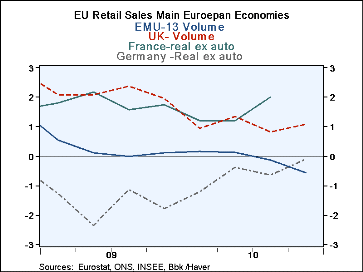 Global| Feb 03 2011
Global| Feb 03 2011Retail Sales Falter in Europe
Summary
Retail sales in the Zone fell by 0.6% in December. They are lower over 12-months by 1% as well. German sales are lower Yr/Yr and UK sales are flat. Nonfood retail sales fell in December and are lower by 1.3% Yr/Yr in the Zone. The [...]
 Retail sales in the Zone fell by 0.6% in December. They are lower over 12-months by 1% as well. German sales are lower Yr/Yr and UK sales are flat.
Retail sales in the Zone fell by 0.6% in December. They are lower over 12-months by 1% as well. German sales are lower Yr/Yr and UK sales are flat.
Nonfood retail sales fell in December and are lower by 1.3% Yr/Yr in the Zone.
The European consumer is not getting it in gear. Europe is of course under all this austerity pressure and for Ireland and the UK the pressure is stepping up this year. Spain, Portugal and Greece are under continued pressure from markets. Italy has a slightly different set of problems. Belgium is still trying to form a government...details, details... Germany voluntarily put its own 'austerity' program in place.
The ongoing plan to polish the European financial backstop plan has helped to reduce rate spreads among troubled Zone borrowers. These spread reductions enrich market participants not the borrowing countries. When these borrowers go to market again, if the fears remain restrained, they will reap the benefits of lower spreads. But for now this is in the background and is not help to financing costs.
The bottom line for 2011 is this: It's pretty hard to get growth going where austerity is spreading. It's hard to expect investment or capital goods to stimulate output when consumption is weak on a widespread basis. Developing economies largely are growing but most of them have an export-led growth strategy in which they export to the more industrialized countries. But these export-target countries are exactly the same ones feeling the pain of their debt and implementing austerity with the result that consumption has remained weak. The most highly industrialized countries can't depend on the continued 'strong growth' of the less developed countries unless they, in turn, can depend on the G10-countries to maintain strong domestic demand - and that simply is not happening.
Austerity might be good for the long run, but you have to survive its effects in the short run. There is also a certain FALLACY OF COMPOSITION in play. What is good for one country to do may not be good for all countries to do...at the same time.
| Euro-Area Retail Sales Volume | ||||||
|---|---|---|---|---|---|---|
| Dec-10 | Nov-10 | Oct-10 | 3Mo | 6MO | 12Mo | |
| Zone Total | -0.6% | -0.3% | 0.0% | -3.8% | -2.3% | -1.0% |
| NonFood | -0.5% | -0.3% | 0.3% | -1.6% | -1.6% | -1.3% |
| Textiles | #N/A | -0.3% | 0.2% | -5.0% | 5.4% | 4.2% |
| Books news, etc | 1.1% | 2.0% | -2.0% | 4.4% | -3.9% | -5.6% |
| Country detail Volume | ||||||
| Germany:VolxAuto | -0.3% | -1.9% | 0.2% | -8.0% | -5.0% | -1.2% |
| UK(EU):Vol | -0.8% | 0.4% | 0.7% | 0.7% | 0.2% | 0.0% |
| Shaded areas in grey is calculated on a one-month lag due to lagging data | ||||||
Robert Brusca
AuthorMore in Author Profile »Robert A. Brusca is Chief Economist of Fact and Opinion Economics, a consulting firm he founded in Manhattan. He has been an economist on Wall Street for over 25 years. He has visited central banking and large institutional clients in over 30 countries in his career as an economist. Mr. Brusca was a Divisional Research Chief at the Federal Reserve Bank of NY (Chief of the International Financial markets Division), a Fed Watcher at Irving Trust and Chief Economist at Nikko Securities International. He is widely quoted and appears in various media. Mr. Brusca holds an MA and Ph.D. in economics from Michigan State University and a BA in Economics from the University of Michigan. His research pursues his strong interests in non aligned policy economics as well as international economics. FAO Economics’ research targets investors to assist them in making better investment decisions in stocks, bonds and in a variety of international assets. The company does not manage money and has no conflicts in giving economic advice.






